Many churches in urban areas are experiencing huge growth. As the already critically-acclaimed book This is Not America argues, we’ve immigrant Christians and their children to thank for holding back the tide of secularism in the UK, says Kayode Adeniran

Anyone who has ventured to Brixton underground station in south London will resonate with the following scene: the loud (and sometimes confusing) hubbub which greets you as you exit; the slightly imposing smell of incense sticks and crystals being sold by jovial Caribbean men; the West African street preachers accompanied with their microphones and amplifiers offering salvation (via either Jesus or Mohammed) and the rather more serious-looking black radicals, earnestly engaging members of the public on oppression and racism in the UK.
In This is Not America, Tomiwa Owolade says the ideas behind that last vignette (oppression and racism) have been imported from the US. It’s part of the (British?) trend of uncritically allowing America’s history and politics to shape our own public discourse, with sometimes unhelpful results. Owolade argues that, in the context of race, our conversations are often based on US assumptions and filtered through an American lens. This is problematic, as our history and relationship with minorities are different in the UK.
Since 1979, there has been a 50 per cent rise in the number of churches in London
It’s an interesting argument, but perhaps the most remarkable point Owolade raises in his book is to do with the revival of faith in the UK’s urban centres. By most accounts, Christianity has been collapsing in the UK; while 59.3 per cent of the population identified as Christian in the 2011 census, this had dropped to 46.2 per cent by 2021. In fact, the 2021 census confirmed that the majority of British people now have no religious affiliation. It is a common sight to see churches close their doors, with many old buildings repurposed into flats, art galleries or museums.
Growth and change

But curiously, any growth that we do see in the British Church is largely found in areas where immigrants live and, more specifically, those of West African origin. Since 1979, there has been a 50 per cent rise in the number of churches in London. Take a trip down Old Kent Road and you’ll see a picture that is replicated wherever there have been high amounts of immigration – churches large and small sprawled across the city with predominantly immigrant congregations.
In one London borough alone, there are 250 Black-majority churches. Owolade even goes as far as to suggest (perhaps tongue-in-cheek) that those concerned about the erosion of the Christian faith and values would do well to lobby for an open immigration policy for African countries once colonised by Britain!
While these developments pose interesting questions for conservative policy makers, it also poses a challenge to those liberals who are naturally more comfortable with immigration and our increasingly multi-ethnic society. These devout, hardworking immigrants are typically the most socially conservative too. Statistics show that, as a result of the demographic changes that have taken place, while Londoners are more likely to go to church compared to the wider population, they are also more likely to think sex before marriage and homosexuality are wrong.
Reverse mission
There is an irony in the trends we are starting to see, and it is encapsulated in what Owolade explains as “the pizza effect”. In Italy, pizza was a basic dish: a flat bread spread with tomato sauce. When immigrants from southern Italy moved to America, they took pizza with them, but with a sense of renewal - it became a food of multiple toppings and flavours. Then, following the war, pizza was reintroduced to Italy but, this time, not just as a baked flat bread smothered in some tomato sauce - now it was a new national dish with a variety of attractive variations.
These devout, hardworking immigrants are typically the most socially conservative too
In some ways, this analogy is also true of Britain’s relationship to the Christian faith of some of it’s immigrants. An enduring legacy of the British Empire within Africa was the spread of Christianity. Centuries later, the descendants of those colonised and converted are seemingly re-evangelising parts of the UK. Or, at the very least, holding back the tide of secularisation with a vibrant and unflinching faith in the God this nation previously called upon.
A fresh wind
It would be a mistake to think that these trends are enough to re-Christianise the whole nation – cities like London, Birmingham and Manchester are distinctly different to rural villages in Norfolk, Cornwall and Herefordshire. We also shouldn’t forget the rise in those belonging to other faith groups (due, in part, to immigration as well) and what this means for societal cohesion.
The resurgence of faith led by the UK’s immigrant communities is perhaps a prophetic reminder that how we understand those with faith in this country is changing. The old picture of the dark, secularised city and the genteel Christian countryside is probably no longer true. Among the gloom, there are roots of revival which may one day spring to life.




































2 Readers' comments